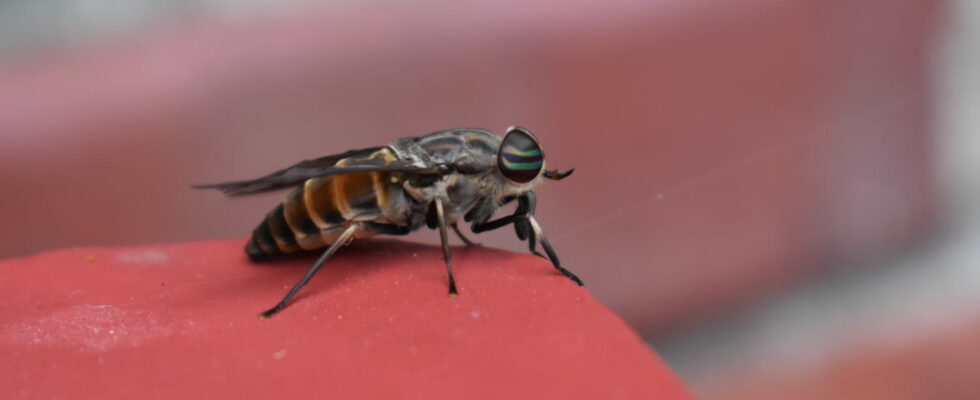The horsefly bites during the day and it hurts. It is usually found in the woods, near animals or water points.
The horsefly belongs to the family of Tabanidae and to the order Diptera (it has only two wings, like the fly). Males do not sting and feed on aquatic insects.mollusks, crustaceans or organic detritus. On the other hand, the female horsefly must suck blood to allow the development of her eggs and therefore she stings ! Like mosquitoes, the horsefly avoids landing on light surfaces or fabrics to avoid being spotted. Concerning the horsefly period, these insects are rather observed in summer, start to fly from the end of May until September. What are the symptoms of a horsefly bite? What to do in case of swelling or allergy? What are the most effective remedies?
Why does a horsefly bite?
The female horsefly, unlike the male which is harmless and does not need to suck blood to feed, has a large proboscis and feeds on the blood of certain animals: so she can sting. She needs the blood of her victims to have the energy necessary for the development of her eggs. The female horsefly is looking for vertebrates such as cattle, hair and humans! They usually supplement their meal by foraging on the nectar of plants.
Photo of a horsefly to easily recognize it
What are the symptoms of a horsefly bite?
The bites are often very painful and cause inflammation accompanied ofa large red patch that may itch but also swell and become hot. Some people who are allergic to horsefly bites may develop more severe symptoms. On the other hand, it is possible to get stung in multiple places due to the presence of several horseflies. This bite causes intense pain. It can be responsible for localized inflammation in humans, in the form of a red spot.In the majority of cases, it does not require any treatment other than local disinfection.“, reassures Tina Gereral, pharmacist. The injection can also, although rarely, inoculate parasites which proliferate in the blood.
How long does a horsefly bite last?
Usually, swelling and itching disappear within a few days. If they persist, do not hesitate to consult a doctor.
Remove the stinger with tweezers
If you get bitten, remove the stinger with tweezers. Disinfect the lesion with an antiseptic solution to prevent superinfection. You can also take an oral painkiller if you feel it is necessary. If you are allergic to insect bites, always carry your first aid kit with you. As much as possible, It is recommended to avoid scratching. “Essential oils can also provide relief. For example, Lavender aspic essential oil is renowned for its analgesic, pain-relieving, anti-inflammatory and anti-infectious properties. lemongrass or chamomile also help relieve the itching sensation. Be careful, they must always be diluted in a vegetable oil before being applied to the skin“, recalls Tina Gereral.
What to do if the horsefly bite swells?
A sting swells the sign of an allergy. The swelling may be accompanied by redness and heat. In this case, it is recommended to consult a doctor quickly.
Horsefly bite and allergy: a risk of edema?
In some cases, horsefly bites can cause significant reactions in allergic patients.Some people suffer from complications: breathing difficulties, nausea, drop in blood pressure, anaphylactic shock, etc. The bites can be responsible for the appearance of a Quinck’s edemae“, describes the pharmacist.
What to do if a horsefly bite doesn’t heal?
If symptoms persist or worsen, it is recommended to consult a doctor quickly who can prescribe the appropriate treatment.
Horseflies love wet skin. So, after swimming, it is recommended to dry yourself properly to avoid attracting them. Also, prefer light clothing and avoid dark colours (especially blue, black and red) because horseflies avoid landing on light fabrics for fear of being spotted. Repellent products purchased in pharmacies can be useful for keeping horseflies away and avoiding bites.
What are the risks for children if they are bitten by a horsefly?
Like adults, children can also be bitten by horseflies.It is necessary to monitor it and observe certain symptoms which could indicate an allergy: difficulty breathing, dizziness or fainting, swellingetc. If any of these signs appear, you should consult a doctor quickly.“, recommends Tina Gereral.
Thanks to Tina Gereral, pharmacist
